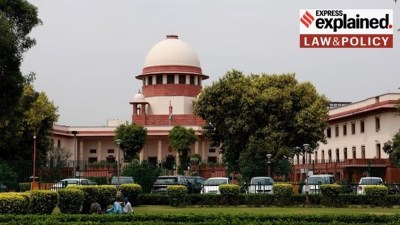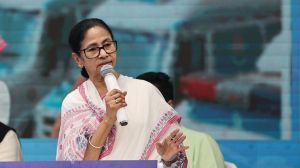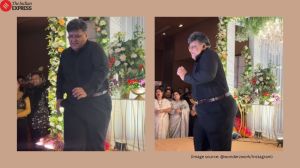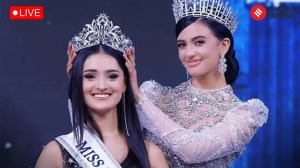Sheikh Hasina, Khaleda Zia, Jamaat-e-Islami: What to know about 5 key figures in Bangladesh politics
The current protests are believed to stem from a larger sense of dissatisfaction over Sheikh Hasina’s 15-year rule. Who are the other major players in Bangladesh politics? We explain.
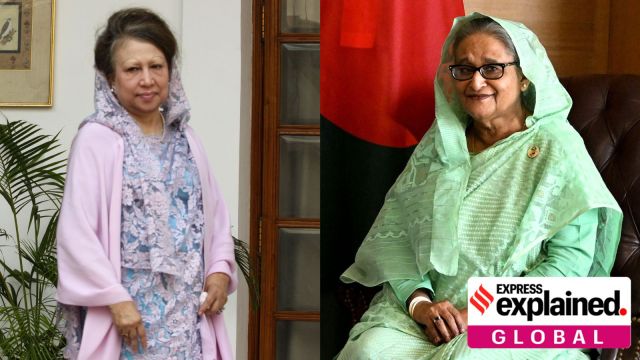 Opposition Bangladesh National Party's Khaleda Zia (left) and Awami League leader and Bangladesh PM Sheikh Hasina. (Express archives)
Opposition Bangladesh National Party's Khaleda Zia (left) and Awami League leader and Bangladesh PM Sheikh Hasina. (Express archives)Bangladesh Prime Minister Sheikh Hasina resigned on Monday (August 5) and fled the country for India, amid protests against her government. Army chief General Waker-Us-Zaman said in an address on Monday afternoon that an interim government would be formed.
The dramatic events came after a fresh round of agitations began on the heels of students’ protests in the last few weeks, against expanding government job quotas for descendants of Bangladeshi freedom fighters.
The latest protests are believed to stem from a larger sense of dissatisfaction over Hasina’s 15-year rule. In the general elections held in January, many opposition parties, like former PM Khaleda Zia’s Bangladesh Nationalist Party (BNP), boycotted the polls.
Who are the major players in Bangladesh politics at the moment? We explain.
- 01
Sheikh Hasina
 Bangladesh Prime Minister Sheikh Hasina. (EPA-EFE/MONIRUL ALAM via PTI)
Bangladesh Prime Minister Sheikh Hasina. (EPA-EFE/MONIRUL ALAM via PTI)Sheikh Hasina, 76, is the leader of the Awami League. Her father Sheikh Mujibur Rahman, also known as “Bangabandhu”, is Bangladesh’s “Father of the Nation”. He became the country's first Prime Minister in 1971 after the war with Pakistan. Rahman was assassinated on August 15, 1975, in a coup orchestrated by the Army in which many members of his family were killed. Hasina and her sister survived as they were in India then.
She won her fifth term as PM — and a consecutive fourth term — in January this year after her party won 223 seats in the 300-member Parliament. Her first stint as PM was in 1996. Her recent years in power have been seen favourably by India in terms of bilateral ties, as she led a crackdown against anti-India elements and cooperated on counter-terrorism.
Bangladesh’s economy has also lodged high growth rates with increasing participation of women, particularly in the textile industry. At the same time, countries like the United States have raised concerns about political crackdowns and recent elections not being “free and fair”.
- 02
Awami League (AL)
 Bangabandhu Sheikh Mujibur Rahman, former Prime Minister of Bangladesh. (Express archives)
Bangabandhu Sheikh Mujibur Rahman, former Prime Minister of Bangladesh. (Express archives)Founded in 1949 after breaking away from the Muslim League, the Awami League was instrumental in the student-led agitations that eventually led to Bangladesh’s independence. AL opposed the Pakistan government for imposing the Urdu language and not devolving powers to what was then known as the East Pakistan province.
After Bangabandhu was assassinated, the 1980s saw several party leaders arrested or executed and the period was marked by political instability for the country as a whole. In 1981, Hasina was elected party president.
The period between 1990 and 2009 saw the AL and Khaleda Zia’s BNP alternately assume power. Between the two, the AL is believed to be more secular in its policy while the BNP is seen as more conservative, having allied with Islamist parties like the Jamaat-e-Islami (more on that later).
- 03
Khaleda Zia and Bangladesh Nationalist Party (BNP)
 BNP Chairperson Khaleda Zia. (Express archives)
BNP Chairperson Khaleda Zia. (Express archives)Khaleda Zia, 79, was elected the first woman Prime Minister of Bangladesh in 1991. She entered politics after her husband Ziaur Rahman, who served as the country’s President from 1977 to 1981, was assassinated in office. Rahman founded the BNP in 1978.
Zia also served as the PM between 2001 and 2006. BNP was seen as a party with significant ground support early on, especially through student politics, but has lost popularity in recent years as Zia retreated from the public eye. She was jailed after being sentenced for a corruption case in 2018, which she said was politically motivated. She was allowed to come out of jail in 2020 over health issues.
In recent years, Zia has battled various ailments and has often gone abroad for treatments. Her son Tarique Rahman has lived in the UK since 2008 and also faces corruption cases. The BNP boycotted the 2024 elections, alleging the Awami League had rigged them. Following the current protests, the government has claimed that the BNP and its student wing, the Chhatra Dal, were instigating the protests.
- 04
Jamaat-e-Islami
The Jamaat-e-Islami was founded in 1975 and is considered among the largest Islamist parties in the country. It has allied with the BNP in the past but was banned from participating in national elections in 2013. It was found that the party’s constitution violated the national constitution by opposing secularism, an Associated Press report states.
The party website says, “Since its inception the Jamaate Islami has been working to implement the Islamic code of life, prescribed by Allah and shown by Prophet Muhammad (peace be upon him), with a view to turning Bangladesh into an Islamic welfare state, consequently, achieving the pleasure of Allah and salvation in the life hereafter.”
Despite the restriction, the party was allowed to conduct political activities, such as holding meetings and rallies. Amid the 2024 protests, Sheikh Hasina alleged that the party and its student wing Chhatra Shibir were exploiting the protests and instigating violence. The government banned the party last week.
- 05
Jatiya Party
 Former Bangladesh PM Hussain Muhammad Ershad. (Via Wikimedia Commons)
Former Bangladesh PM Hussain Muhammad Ershad. (Via Wikimedia Commons)Retired army officer Hussain Muhammad Ershad established the party on January 1, 1986. He was the Chief of Army Staff of the Bangladesh Army and led a coup in 1982, dislodging Ziaur Rahman’s deputy Abdul Sattar from power.
According to a Dhaka Tribune report, Ershad maintained relevance in Bangladeshi politics for three decades, despite being ousted in a coup and imprisoned for corruption. In that time, the party allied with both the AL and the BNP periodically. Ershad’s demise in 2019 marked a decline in the party’s fortunes. Today, it mainly holds power in Rangpur, in the northwestern region.
The party has 13 MPs in Parliament. Its co-chairman Anisul Islam Mahmud and secretary general Mujibul Haque Chunnu were called in to attend the meeting with the chief of army staff general Waker-uz-Zaman on Monday, according to Bangladeshi media organisation Prothom Alo. It could suggest a potential role in the interim government which will now be formed.


- 01
- 02
- 03
- 04
- 05


 Bangladesh Prime Minister Sheikh Hasina. (EPA-EFE/MONIRUL ALAM via PTI)
Bangladesh Prime Minister Sheikh Hasina. (EPA-EFE/MONIRUL ALAM via PTI) Bangabandhu Sheikh Mujibur Rahman, former Prime Minister of Bangladesh. (Express archives)
Bangabandhu Sheikh Mujibur Rahman, former Prime Minister of Bangladesh. (Express archives) BNP Chairperson Khaleda Zia. (Express archives)
BNP Chairperson Khaleda Zia. (Express archives) Former Bangladesh PM Hussain Muhammad Ershad. (Via Wikimedia Commons)
Former Bangladesh PM Hussain Muhammad Ershad. (Via Wikimedia Commons)